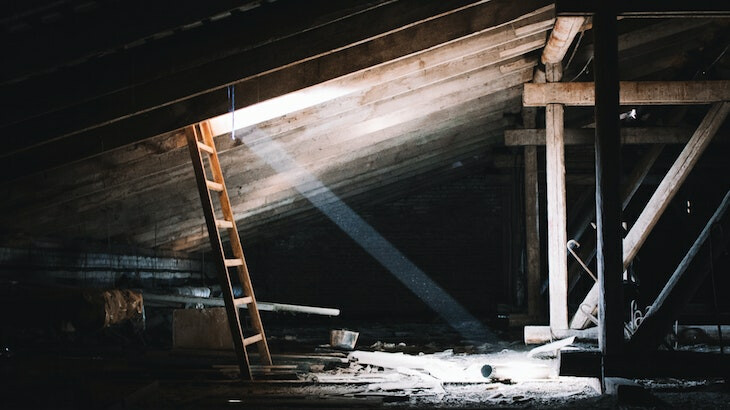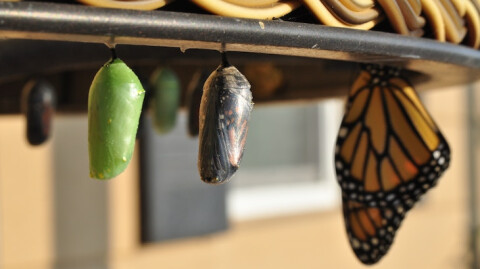People have all kinds of coping strategies during this pandemic. Some, living in the country, chop wood. Some gather their friends on Zoom, or binge watch TV, or spend a lot more time on their computers. My strategy is to clean, recycle, downsize, donate and throw away. Three long-standing previously avoided tasks have captured my attention in this lockdown: the garage, the basement and the attic.
The first two were accomplished relatively easily. Jeff and I sorted, swept and brought order out of chaos. But the attic has proven to be a greater challenge. It runs the entire length of the house and is always dark. It is too cold in the winter, and too hot in the summer. It is where, in the last 35 years, we have stored everything we no longer needed. (Out of sight, out of mind.) This storehouse is a collection of many objects that we imagined we might someday need : including, but not limited to, clothes that were too tight or too large, boxes of books (both children and adult), discarded sports equipment, children’s art projects, college notebooks, and artifacts from travels. We also have a collection of cardboard boxes from an assortment of new appliances, that could be used to ship in case they required repair. Most of these appliances have been discarded. We kept the boxes.
Approaching the layout of the attic like the face of a clock, we started at noon, and have proceeded to 9 :00. We have spent days and weeks sorting and discarding. Three quarters of the space is now fully organized. But not the last portion. I find myself unwilling, unable, paralyzed and stalled. It is not a physical exhaustion. It is an emotional exhaustion. Running out of steam before a project is completed is frustrating! What is it about a pandemic that does not encourage productivity or creativity? Well, to name just a few factors…
- Everyone you love, everyone you know and complete strangers can inadvertently sicken and possibly kill you. The assumption that all the people we come in contact with might just be contagious creates an environment of stress and suspicion that is completely toxic to our fundamental need for human connection.
- Even worse, we could all be contagious ourselves, with absolutely no symptoms, and unwittingly do substantial harm to others.
- This pandemic is a genuine catastrophe. The grief is immense. People are losing their lives and their livelihoods. There are no opportunities to mourn together, or to celebrate together. No funerals. No weddings to attend. The media focuses on measurable unemployment and financial losses. Humanity’s sacrifices have been as devastating.
- We have also lost most of the small and ordinary comforts of our existence: going to a restaurant with friends, going to the library, or going on vacation or to a sporting event.
- Not knowing. No one knows what is going to happen. No one can confidently schedule a trip in the near future, or plan to visit with beloved family or friends. Until we have a treatment, a vaccine and adequate testing, science will not be able to predict the course of Covid-19. Lewis Thomas, an articulate science writer, once observed that our not knowing, "is the family secret of 20th century science… It is kept hidden in the darkest closets, sometimes glimpsed staring out from attic windows, like a mad cousin of learning." But now, in the first half of 2020, we all know about our ignorance. No one knows what lies ahead.
So, what is capable or moving us out of our frustration, anger, impatience and paralysis? A few important resources come to mind, including,
- Look to the inspiring example of others, especially the doctors, nurses and essential workers. Look to the parents who are managing to work at home, homeschool their children and keep their families safe. Look at the awesome work that The Rev. Sarah Stewart and the gifted staff , and the talented lay members of the church have managed to accomplish in a virtual format. The congregation at First Unitarian is still whole and functioning.
- Find your own way to be of service to others. We can make a phone call to someone who is isolated. We can write a loving note to someone far away. We can say hello to a stranger (from a distance of 6 feet). We can make a mask, or make a financial donation to an organization that is feeding the hungry. As Mother Teresa once said, “It is not about how much you do, but how much love you put into what you do that counts.”
- Return to your own deep wells of truth and reality and compassion. For me that is the saints and poets, especially the Persian mystics Hafez and Rumi. Hafez, wrote “our existence is an enigma, our answers only fables and spells.” Rumi maintained that not knowing, being “bewildered, dumbfounded, and crazed” was conducive to being more receptive to a higher power. Now, when everyone has to wait for directions, wait for answers and wait for a way forward, T. S. Eliot wrote,
For hope would be hope for the wrong thing; wait without love,
For love would be love of the wrong thing; there is yet faith
But the faith and the love and the hope are all in the waiting.
Wait without thought, for you are not ready for thought:
So the darkness shall be the light, and the stillness the dancing."
I suppose that means I have to go back upstairs into the dark attic. Trusting that someday, we all will know that even in this darkness, there is light.




